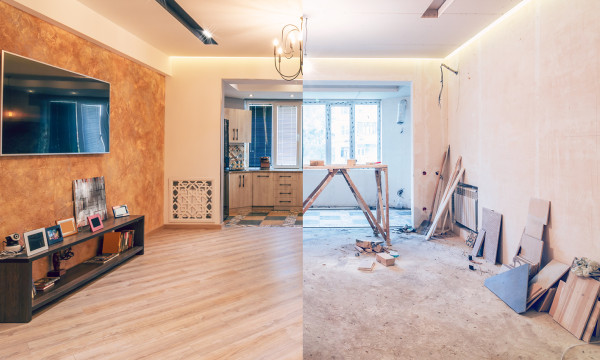What to know when choosing a place to live

Moving out for the first time can be exciting and stressful at the same time. There’s so much to consider when you’re apartment or house hunting, and it can be tough to gauge every factor when determining if a living situation will be a good fit for you — especially if you’ve never done it before. To ease this process, we’ve compiled some tips and things to be aware of when choosing a residence.
Evaluating a living space
When searching for a new living situation, the first things you’ll want to determine are your non-negotiables — things you can’t (or strongly prefer not to) live without. You’ll need to weigh things like how many bedrooms and bathrooms you want alongside how recently the space was updated and which amenities are included with your purchase. Just remember, your options will narrow with each new non-negotiable, so choose them wisely.
Once you find some candidates that match your preferences, you’ll want to compare their offerings. It’s also a good idea to go on some in-person tours to see the space with your own eyes — seeing pictures and actually being there are two totally different things. When touring, take measurements to ensure your furniture and belongings will fit where you need them to, and check for damage or any other deterrents that may impact your decision.
Location, location, location
Beyond the living space itself, it’s important to think about the city, neighborhood, or community you’re moving to. How close is it to work or school? How close is it to grocery stores, restaurants, and other necessities? How close is it to your friends, family, and anyone else you may need to visit regularly? Finding a location that provides easy, convenient access to the places you frequent will make any living situation that much better.
With both the living space and its surrounding area, it can be beneficial to research what people are saying online. Sites such as Google, Yelp, Reddit, and various online real estate platforms can offer a community consensus on the property you’re looking into. Looking at these reviews can notify you about aspects of the property that you may not have noticed, and the leaser or seller may not have told you about it themselves. Just remember, bad experiences are more likely to prompt an individual to write a review than good experiences are. If a complaint comes up repeatedly in reviews, take note of it, but otherwise keep in mind that reviews can contain biased accounts and isolated incidents.
Renting vs. buying
One of the most important decisions in choosing a residence is deciding whether to rent or buy a property. Renting will often provide you with convenient services like lawncare, maintenance, and trash removal, and apartment renting often provides amenities such as an on-site gym, a pool, and a clubhouse. There’s also a lower barrier to entry with renting — upfront costs often just include an application fee and a deposit fee, whereas you may have to put more money down if you’re buying a home.
When buying a property, you don’t get the perks and amenities of renting, and the time and cost commitments can be much higher. Additionally, you’ll have to fix (or hire someone to fix) anything that breaks on the property, whereas maintenance services may be included at a rented space. However, as a buyer, you will get to own an asset that will likely appreciate over time. This is a huge benefit compared to renting, where you’re paying monthly for rent and utilities instead of paying for a mortgage and improvements on an asset you can eventually sell.
Both renting and buying can be smart options — renting provides convenience and flexibility, while buying provides stability and is generally better for long-term wealth. Knowing the pros and cons of each will help you decide which route better fits your situation.
What rights do renters and homeowners have in Nebraska?
There are laws in place that protect both renters and homeowners in Nebraska. Renting is largely governed by the Uniform Residential Landlord Tenant Act, which states that landlords must:
- Keep the property in a safe and habitable condition
- Keep common areas safe and clean
- Maintain electrical, plumbing, heating, ventilation, and appliances supplied by the landlord
- Provide running water and reasonable amounts of hot water
- Provide reasonable amounts of heat
Homeowners are protected under the Nebraska Fair Housing Act, which makes discrimination in housing unlawful. Nebraskan homeowners’ rights say that:
- Discrimination based on race, color, national origin, religion, sex, familial status, or disability is prohibited as it relates to housing transactions
- You are protected from retaliation if you oppose discriminatory practices
- Lenders must provide disclosures about the real estate transaction
How to maintain financial stability after your housing choice
A new living arrangement can provide an opportunity to build credit and, if you purchase a house, manage an asset of your own. But, if you fall behind on payments, the debt can be tough to get out of. It’s important to choose a living situation that is well within your means financially, and to budget accordingly once you’ve moved in.
UBT is here to help
Whether you choose to rent or buy, UBT has many resources available in the Learning Center. And if buying a home is an option for you, click here to see how UBT can help.
Learning Center articles, guides, blogs, podcasts, and videos are for informational purposes only and are not an advertisement for a product or service. The accuracy and completeness is not guaranteed and does not constitute legal or tax advice. Please consult with your own tax, legal, and financial advisors.
Loan products subject to credit approval.





